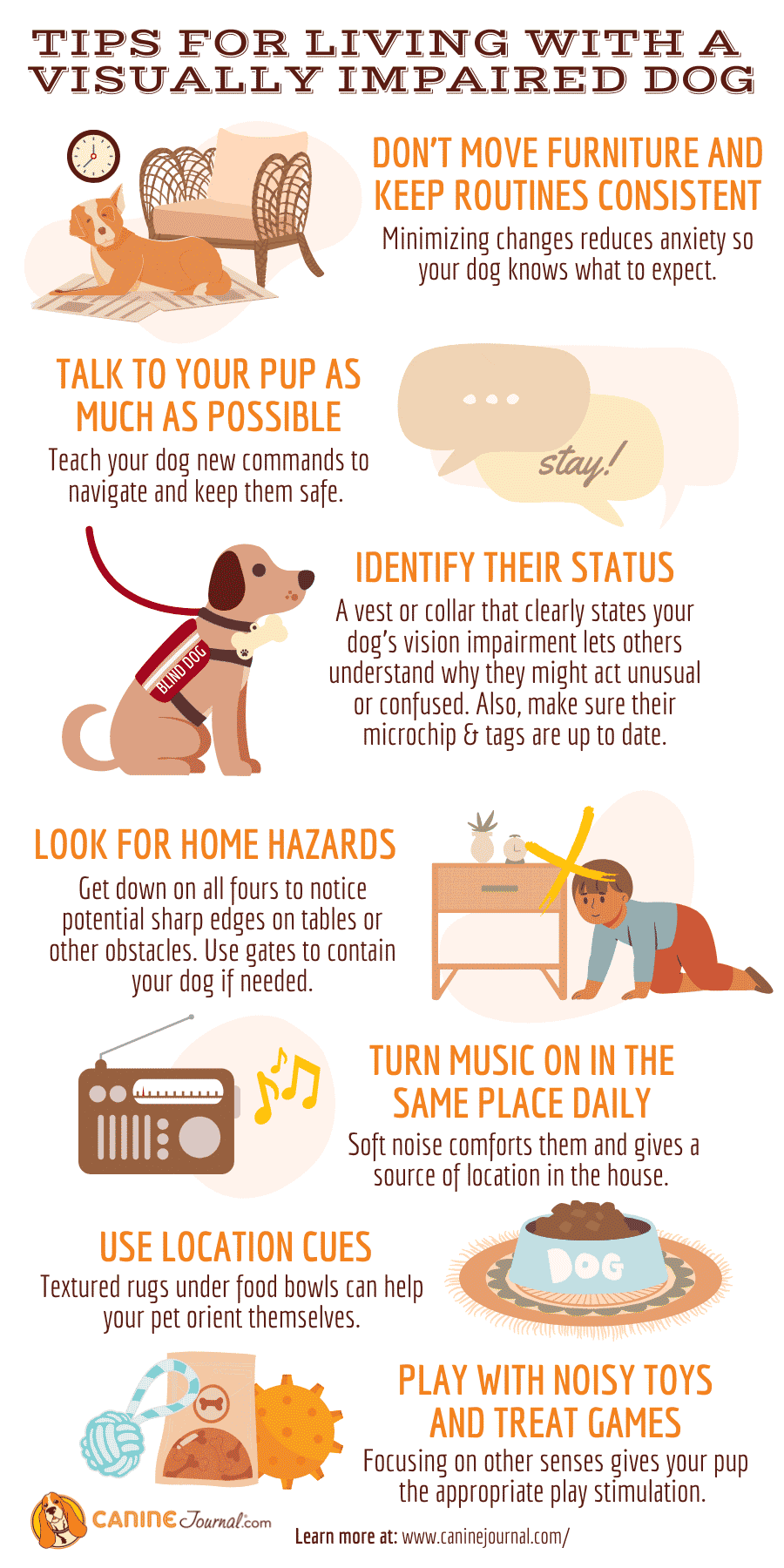Symptoms, Types Of Eye Issues, & Treatment Options
To keep the lights on, we receive affiliate commissions via some of our links. Our review process.
Dogs, just like people, can suffer from eye problems and progressive loss of vision, especially in their older age. Thankfully, dogs are not as reliant as us on their vision. Their heightened smell and hearing mean they usually manage gradual changes to vision well. In this article, we discuss might cause a pup to lose their sight, what your veterinarian may suggest doing, and how to cope with a blind dog at home.

How Normal Eyesight Works
First light enters the eye through the pupil before hitting the back of the eyeball in an area called the “retina”. The retina contains thousands of specialized cells called “photoreceptors”, which can convert that light signal into electrical nerve activity. This electrical activity travels up the nerve from the back of the eye to the brain. The impulse is then relayed to a specialist region of the brain called the “primary visual cortex”. Here the brain interprets those electrical impulses into pictures of the outside world.
Loss Of Vision In Dogs Causes
When approaching a case of vision loss in dogs, it can be helpful to break down the vision pathway into sections and then consider the diseases that can affect each part of the pathway.
The described diseases here are just a few examples, and this is in no way a comprehensive list. There are enormous textbooks solely dedicated to all the different possible conditions affecting the eyes and vision, with specialty veterinarians undergoing a further 4+ years of training after graduation to learn about them.
Problems With The Eyeball

There are many possible causes of disease in your pup’s eyeball that can impact their ability to see. If you ever notice your dog’s eye seems painful (signs include holding the eye shut, increased tear production, pawing at their face), or if the eye is red, swollen, or cloudy, this should be checked urgently by your veterinarian. Sadly, failure to do this may mean your pup loses their vision or even needs to have their eye removed.
When approaching diseases affecting the eyeball, it’s easiest to break down the eyeball structure into the following components:
Cornea
The cornea is the front surface of your eyeball. Anything that damages this region, such as a trauma or infection, can lead to the cornea becoming cloudy. Less light can get through this cloudy surface, reducing your pup’s visual capacity.
Anterior Chamber
This is the region between the cornea and retina. An important condition that involves the anterior chamber is glaucoma. Due to this disease, the pressure in the whole eyeball increases, causing damage to the retina and nerve at the back of the eye. It is also an extremely painful condition for our furry friends. Other conditions of the anterior chamber that can affect vision include inflammation, infections, or tumors in this region.
Iris
The iris is the pigmented region of the eyeball with its central pupil that allows light to the back of the eye. Problems with the iris that can affect vision include inflammation or tumors. The iris can also “atrophy” or thin. This affects how the pupil control light access to the eye. While it does not cause blindness in dogs, it may affect your pup’s ability to adapt well to changes in light.
Lens
The lens is a structure that focuses light on the back of the eye, allowing your dog to clearly see things at different distances from their body. The most commonly discussed disease of the lens is cataracts. Cataracts are opacities that develop in the lens that limit or prevent light from accessing the eyeball. They can occur for several reasons and, in severe cases, can lead to blindness in dogs or even glaucoma developing.
Posterior Chamber
This is the fluid-filled region of the eye behind the lens and in front of the retina. Diseases that can affect this part of the eye include certain types of cancer, infections, and inflammation.
Retina
The retina is a very specialized structure that sits at the back of the eye containing those specialized photoreceptor cells and the start of the “optic nerve”, the nerve that runs from the eyeball to the brain. The retina can be affected by diseases such as inflammation, high blood pressure, infections, cancers, and some degenerative diseases where the retina degrades – sadly, these degenerative diseases can be seen in young dogs too – examples include Progressive Retinal Atrophy and Collie Eye Anomaly.
Problems In The Nerves
The nerves run from the back of your dog’s eye into the brain and then follow a complex pathway through the brain to the visual processing centers. Disease at any point in this pathway can affect the ability of their electrical messages to get where they need to go correctly. This can impair or even prevent an animal from being able to see. Diseases include inflammation, some infections, immune-system dysregulation, and certain tumors. The nerve disease can be focal, affecting just the eye nerves, or, more generalized affecting the whole body.
Problems In The Brain
The brain itself is a complex jumble of nerves that intercommunicate. Diseases that affect the brain, such as tumors, infections, or inflammatory conditions, can potentially impact your pet’s vision negatively. Often, but not always, brain disease may present with other signs such as seizures, behavior changes, or weight loss.
Problems Elsewhere In The Body
Many general health conditions can also affect your pup’s eye health. Examples include diabetes mellitus, which can cause cataract development, or elevations in blood pressure which can affect the retina. Some whole-body infections can affect your pup’s eyes – examples include Canine Distemper Virus, Leishmaniasis, and Rabies. Thankfully these infections are uncommon in the United States.
Is Vision Loss Just A Problem For Old Dogs?

Sadly, vision loss and eye problems are not just seen in older dogs. For example, some inherited conditions can cause vision loss in young dogs. Often these conditions can be tested before two dogs are mated. Breeders use these tests to try and prevent the disease from being passed to the puppies. When buying a new puppy, make sure you research what conditions the breed may be susceptible to, check if testing is possible, and ask your breeder about their testing policies – a good breeder is happy to show you the veterinary testing certificates for the parents.
What Symptoms May I See If My Dog Is Losing Her Vision
Your dog’s signs may be undeniable, such as bumping into furniture or struggling to locate her food bowl or favorite toys. You may also notice changes to the appearance of the eye (for example, it may appear red or white in coloration), and seem cloudy or painful. Other signs a dog is going blind include:
- Walking more cautiously than usual
- Being reluctant to go outside at night
- Being more clumsy
- Being easily startled
- Getting lost
- Seeming confused or disorientated
Generally speaking, if your pup’s vision loss has been gradual, the signs are more subtle as they learn to cope. A sudden loss in vision can lead to more dramatic clinical symptoms and be very distressing for both dogs and pet parents alike.
What Can Be Done To Investigate And Treat My Dogs Vision Loss?
The first step in investigating vision loss is a comprehensive history of your pet’s behavior and clinical signs. This gives your veterinarian an idea of whether more systems are involved than just the eyes themselves. Your veterinarian will then perform a physical examination. This likely includes using a special light to assess the back of the eye and measuring the number of tears produced by your dog’s tear ducts, measuring the eyeball pressure, and even staining the eye’s surface with special dyes to look for problems.
The recommended investigations and treatment varies depending on what your vet suspects may be causing the problem. Investigations can include anything from blood testing, blood pressure measurement, and needle samples from the eyeball, to ultrasounds of the eyeball or even MRI scans of the brain. Some dogs need a whole-body workup to get to the root of the problem. Your veterinarian will discuss with you the best diagnostic approach, tailored to your pet’s clinical needs.
Once a diagnosis has been obtained, treatment can be advised. Again, this depends on the nature of the disease process present. Some conditions causing vision loss require an operation, some require medicine, and some need both. Sadly, a subset of the causes of vision loss is not be treatable. This is why obtaining a diagnosis is essential. It allows you to make informed decisions about what is best for your pet.
Living With A Blind Dog
If your dog is losing or has lost his vision, there are some important adaptations you should make to keep him happy and safe at home:
- Don’t move furniture and keep routines consistent. Minimizing changes reduces anxiety so your dog knows what to expect.
- Talk to your pup as much as possible. Teach your dog new commands to navigate and keep them safe.
- Identify their status. A vest or collar that clearly states your dog’s vision impairment lets others understand why they might act unusual or confused. Also, make sure their microchip & tags are up to date.
- Look for home hazards. Get down on all fours to notice potential sharp edges on tables or other obstacles. Use gates to contain your dog if needed.
- Turn music on in the same place daily. Soft noise comforts them and gives a source of location in the house.
- Use location cues. Textured rugs under food bowls can help your pet orient themselves.
- Play with noisy toys and treat games. Focusing on other senses gives your pup the appropriate play stimulation.

Beyond Blindness In Dogs
Generally speaking, if your pup has gradually lost her vision and the condition causing it is not painful or affecting her general health, she should cope well. Blind dogs can have an excellent quality of life. As the causes of vision loss of vast and many can be severe, it is essential to contact your veterinarian as soon as you suspect your pup may be having problems with her sight. Learn more about dog eye diseases including conjunctivitis and uveitis, plus find out if dogs can see color. Check out this article about dog goggles and protective eyewear to learn more.
Tagged With: Eyes





This is very interesting, You are a very skilled blogger.
I’ve joined your rss feed and look forward to seeking more of
your excellent post. Also, I’ve shared your web site in my social networks!
Hello there! Would you mind if I share your blog
with my facebook group? There’s a lot of folks that I think would really enjoy
your content. Please let me know. Cheers
naturally like your web site however you have to
take a look at the spelling on quite a few of your posts.
A number of them are rife with spelling problems
and I find it very troublesome to tell the reality however
I’ll certainly come again again.
I have fun with, cause I discovered exactly what I used to be looking for.
You have ended my four day lengthy hunt! God Bless you
man. Have a nice day. Bye
Hi! I realize this is somewhat off-topic however I needed to ask.
Does building a well-established blog like yours require a lot of work?
I’m brand new to running a blog but I do write in my journal everyday.
I’d like to start a blog so I can easily share my own experience and feelings online.
Please let me know if you have any ideas or tips for new aspiring bloggers.
Appreciate it!
I’d like to find out more? I’d want to find out some additional information.
Everyone loves what you guys are usually up too. Such clever work and reporting!
Keep up the wonderful works guys I’ve incorporated you guys to my own blogroll.
This post provides clear idea in favor of the new viewers of blogging, that in fact how to
do running a blog.
Thanks for sharing your thoughts on website. Regards
What’s up, its fastidious article regarding media print, we all understand
media is a enormous source of information.
You should take part in a contest for one of the best websites on the internet.
I am going to highly recommend this web site!
I do not know if it’s just me or if everyone
else encountering problems with your site. It seems like some of the text on your content are running
off the screen. Can someone else please provide feedback and let
me know if this is happening to them too? This might be a problem with my internet browser because I’ve had this happen previously.
Many thanks
hi!,I like your writing very a lot! share we keep up a
correspondence extra approximately your article on AOL? I need an expert in this area
to unravel my problem. Maybe that’s you! Taking a
look ahead to look you.
You ought to take part in a contest for one of the highest quality blogs on the internet. I will recommend this site!
You could be dropped into any nation or state and the job is nearly the same.
If you choose to acquire an added battery, you’ll get up to 8
hours of total battery life.
It makes it impossible to preserve an accurate count and achieve any edge more than the casino.
We only evaluate on the net casinos that are powered by the ideal computer software groups.
The principal difference is that the maximum amount of bonus funds you can claim is ramped up.
My brother recommended I might like this blog.
He was totally right. This put up actually made
my day. You cann’t consider simply how much time I
had spent for this info! Thank you!
When some one searches for his required thing, thus he/she
wishes to be available that in detail, thus that thing
is maintained over here.
Have you ever considered publishing an e-book
or guest authoring on other blogs? I have a blog based upon on the
same subjects you discuss and would love to have you share some stories/information. I know my viewers would value your work.
If you’re even remotely interested, feel free to shoot
me an e mail.
Great delivery. Sound arguments. Keep up the good spirit.